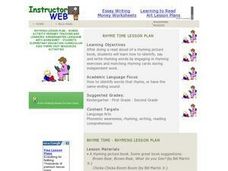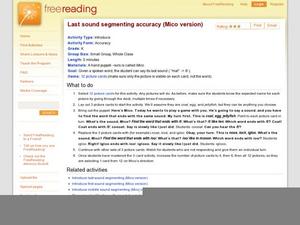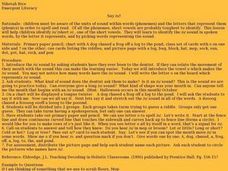Curriculum Corner
Digraph Boggle
Th, wh, ch, and sh are only some of the consonant digraphs early readers need to master. Increase skills and digraph recognition with a fun game. Children find words containing an initial or final digraph, circle them, and then write...
Curated OER
Understanding 10: Backwards and Forwards
Help your young mathematicians completely master 10 by practicing one-to-one correspondence, number recognition, and recording numbers displayed. They make 10 with groups of two-different colored cubes and color in 10-frames to show how...
Curated OER
Investigation Can You Build This?
Students work in small groups to explore spatial relationships while building with color cubes. Students must identify positions of blocks to partner, recreate a model, and color a sketch of their structure appropriately.
Curated OER
Rhyme Time Lesson Plan
What words rhyme? Help young learners deepen their understanding of rhyming words with this interactive plan. First they identify some words that rhyme, then they participate in a picture walk. Use books with rhyme, like Come Rhyme with...
Curated OER
Last Sound Segmenting (Mico Version)
Get your scholars excited about phonemes using Mico the puppet; they use the picture cards to examine three words at a time. Mico says the ending sound of one of the words, and learners determine which of them is a match. You'll want to...
Curated OER
First Sound Segmenting Accuracy
What's the sound, Mico? Use your class' favorite puppet (in this example, Mico) to teach them about initial sounds in single-syllable words. Using the picture cards provided, choose three and lay them out in front of learners. When Mico...
Curated OER
Introduce Last Sound Segmenting (Mico Version)
What is Mico trying to say? Use a puppet to make this final-phoneme activity more engaging for kindergartners. Using three picture cards at a time (included), they listen to him say a final sound. To which of the three images is he...
Curated OER
Periodic Table of the Elements
First graders discuss, at their level, the concept of elements making up all matter. They discover the story of Dimitri Mendeleev and his discovery of the Periodic Table of the Elements. They locate and color some of the most common...
Curated OER
Animal Syllables
Animal names are a great way to practice syllables with words your young scholars will be familiar with! Using images, students examine 7 animals and color in the number of paws that correspond with the number of syllables in that animal...
Curated OER
Introduce /t/
What sound does the letter t make? As scholars develop letter recognition, form sound associations with strategies like these. Explain the tongue movement in making the /t/ sound, asking learners to try it. Draw the t on the board and...
Curated OER
Introduce /r/
Use these inventive strategies to focus on the letter r, forming sound associations along with letter recognition. Explain the tongue movement in making the /r/ sound, asking learners to try it. Draw the r on the board and give examples...
Curated OER
Introduce Soft-C
Do your emerging readers know that letters sometimes borrow the sounds of other letters? Explore the soft /c/ sound, explaining that c has borrowed the sound from s. After giving scholars some examples of words that begin with this...
Curated OER
Kindergarteners Study the Four Seasons
Examine the weather of the four seasons, look at seasonal activities, and tell which months are part of each season with this lesson. Your class will play a game, sing a song, and write additional stanzas to seasonal poetry.
Curated OER
Fish Eyes Lesson Plan
Students practice counting and matching quantities using paper fish. In this early mathematics lesson, students create a fake fishing pole and attempt to identify numbered paper fish they acquire from a bucket. Students read the book...
Curated OER
"Uuuuuuggghhh That Hurts"
First graders give examples of consonants and vowels. They review the sound the /u/ phoneme makes and then play a word creation game placing letters together to make the /kuuuu/ sound which bumps into /p/ forming the word "cup" as a class.
Curated OER
Spell Race
Students work on their spelling skills and word recognition skills while using different locomotor movements.
Curated OER
Simon Says
Second graders play Simon Says. The teacher uses a worksheet imbedded in this lesson which has suggestions for action commands to be used during the game. The intent is for students to focus on the action verbs which are built in to the...
Curated OER
The Cat Ate My Apple
Students recognize the phoneme for the short vowel a in written and spoken language. Through a variety of activities, they discriminate the short vowel /a/ from other phonemes. Students associate the phoneme with its letter...
Curated OER
Evaluating Progress
Teachers explore various ways to evaluate Students progress. They study the testing of word recognition, sound discrimination, grammar knowledge, oral comprehension, and oral expression. They explore ways to provide feedback after...
Curated OER
What Do Mothers Do?-- Full Color Copy
In this reading worksheet, students read a small book which they make by stapling 10 fully illustrated pages together. The story depicts mothers in their many roles at home, and ends with the children expressing appreciation.
Meadows Center for Preventing Educational Risk, University of Texas at Austin
Lesson 9 - Contractions
Is it do'nt or don't? How about doesn't or does'nt? A lesson on contractions helps learners identify, form, and use contractions. Components within the plan include direct instruction on decoding and encoding contractions, as well as...
Curated OER
Say /o/
Ollie the octopus is occupied! Use this tongue twister to help youngsters learn the /o/ sound. After practicing the target sound, learners should print the letter. When they are familiar with the letter and its sound, the group will...
Curated OER
Go Fish
First graders explore rhyming words. They listen to the book One Fish, Two Fish, Red Fish, Blue Fish and discuss the rhyming words. After being placed into groups, they play the game, "Go Fish" and find matching rhyming words. They...
Curated OER
How 'Bout Them Apples?
Students recognize the short vowel a in written and spoken language. Through matching activities, they discriminate the short vowel /a/ from other phonemes. Students associate the phoneme with its letter representation in words and phrases.

























